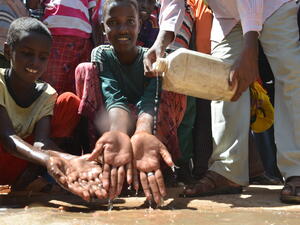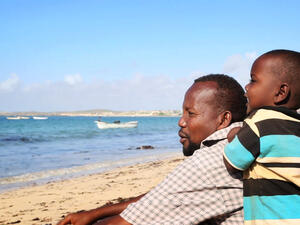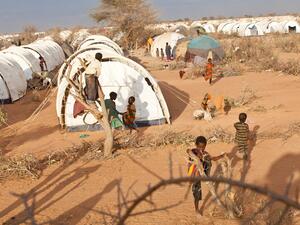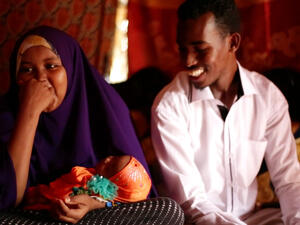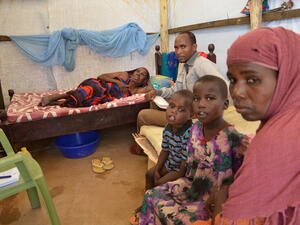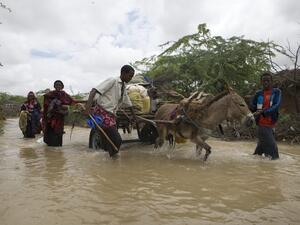With refugees returning, UNHCR asks for funds for Somalia
With refugees returning, UNHCR asks for funds for Somalia

Former Somali refugees frequently return to totally devastated homes and villages.
GENEVA, Feb. 8 (UNHCR) - Calling Somalia a "great experiment and test case," United Nations officials have appealed to donors to come to the help of the war-devastated African country as the second of six UNHCR-chartered planes flew Somali returnees from refugee camps in Kenya into the port of Berbera.
The voluntary return of the refugees from camps in Kenya was the first in nearly two years, with more than 200 people scheduled to be airlifted to north-west Somalia by early next week. UNHCR plans to repatriate an additional 50,000 Somali refugees from neighbouring states by the end of the year.
"Somalia is a great experiment and test case," Randolph Kent, the U.N. Humanitarian Coordinator for Somalia, told a one-day meeting of donors in Geneva Thursday. "Where else in the world is there a society that has completely collapsed but is seeking to rebuild itself?"
U.N. agencies asked donors for $83 million for Somalia and urged them to commit more funds. In recent years only half of the funding required for refugee programmes has been raised. Simone Wolken, UNHCR's Representative for Somalia, appealed for $6.8 million dollars for 2002, money earmarked for the reintegration of the projected 50,000 returnees.
"This year, we plan to assist the return of more than 50,000 Somali refugees mainly in Ethiopia but also in Kenya, Djibouti and Yemen," Wolken said. "We will focus on large-scale returns to north-west Somalia and hope to complete this by the end of the year. In 2003, we expect to assist some 12,000 refugees to return to the north-east and at the same time consolidate further our reintegration projects."
Last year, 50,000 Somali refugees from camps in Ethiopia returned home, chiefly to north-west Somalia, known as Somaliland, amid growing concern from aid organisations that the increasing number of returnees would quickly outstrip the region's capacity to reintegrate them. The organisations called for more relief and development aid for Somalia's ravaged economy.
Since 1993, more than 500,000 Somali refugees have returned home from countries bordering the war- and drought-ravaged country on the Horn of Africa following the collapse of the Siad Barre regime in 1991 and the ensuing civil war that led to the flight of 800,000 people.
Wolken told the meeting that in the last eight years UNHCR had implemented more than 600 small projects in areas such as income generation, crop production, water projects, schools and hospitals throughout the country at a cost of some $17 million. But she described the agency's work in a country with virtually no infrastructure as "spot repairs."
The UNHCR representative noted that there was still a "missing link" between relief assistance and development aid in Somalia, and called for bigger donor support for the development agencies.
"Through UNHCR's efforts, more than 400,000 people in Somalia have access to clean water, over 350,000 women can get mother and child health care, and nearly 60,000 students have access to schools and education," she said. "But all this does not give them gainful employment."
"UNHCR's action needs to be complemented by a larger development effort, otherwise our projects remain islands of intervention," Wolken added.
On the issue of refugee returns, the UNHCR representative said that an increasing number of refugees from less stable parts of Somalia such as the Juba Valley in the south-west continue to approach the agency for repatriation assistance resulting from a general desire to return home after years of exile. UNHCR, however, is not yet promoting return to areas where security conditions remain volatile.
Wayne Long, UN Chief Security Advisor for Somalia, described the security situation in the country as "challenging," although armed militia were "for the most part off the streets." He said that "if we get proper assistance into Somalia, we can rob the militia of young recruits, take away their AK-47 guns, and give the young men an education and a job."
Meanwhile, in the Dadaab refugee camp in Kenya, Shukri Mohammed Farah, 27, and her four children on Wednesday boarded the first UNHCR-chartered flight to Berbera. A visibly excited Farah, surrounded by her four children, all born in the dusty camp, said she was returning to her home in Lasanood to join her husband, who returned two years ago.
"My mother and brothers are also in Lasanood. I want to return home because life in the camp here is difficult and dangerous, particularly for refugee women," said Farah, referring to the significant rate of sexual assault on refugee women and girls who leave the camp to fetch firewood or tend livestock.
"In Lasanood it is safe," she said. "But if I have any problems, my relatives will protect my children and I. Here, I have nobody."


